 Weird Stuff
Weird Stuff  Weird Stuff
Weird Stuff  Mysteries
Mysteries 10 Tragic Disappearances and Deaths in Joshua Tree National Park
 History
History 10 Ways Childhood Really Sucked in the Old West
 Music
Music 10 Name Origins of Famous Bands from the 1990s
 Religion
Religion 10 Biggest Turnarounds by the Catholic Church
 Weird Stuff
Weird Stuff 10 Unbelievable Times Laws Had Unintended Consequences
 Humans
Humans Ten Historic Women Who Deserve Way More Credit Than They Got
 Movies and TV
Movies and TV 10 Films That Spawned Major Lawsuits
 History
History Ten Times Towns Were Wiped Off the Face of the Earth
 Creepy
Creepy 10 of the Most Disturbingly Haunted Public Houses in the UK
 Weird Stuff
Weird Stuff 10 Niche Subcultures That Are More Popular Than You Might Think
 Mysteries
Mysteries 10 Tragic Disappearances and Deaths in Joshua Tree National Park
 History
History 10 Ways Childhood Really Sucked in the Old West
Who's Behind Listverse?

Jamie Frater
Head Editor
Jamie founded Listverse due to an insatiable desire to share fascinating, obscure, and bizarre facts. He has been a guest speaker on numerous national radio and television stations and is a five time published author.
More About Us Music
Music 10 Name Origins of Famous Bands from the 1990s
 Religion
Religion 10 Biggest Turnarounds by the Catholic Church
 Weird Stuff
Weird Stuff 10 Unbelievable Times Laws Had Unintended Consequences
 Humans
Humans Ten Historic Women Who Deserve Way More Credit Than They Got
 Movies and TV
Movies and TV 10 Films That Spawned Major Lawsuits
 History
History Ten Times Towns Were Wiped Off the Face of the Earth
 Creepy
Creepy 10 of the Most Disturbingly Haunted Public Houses in the UK
10 Terrifying Times Europe Recently Said “No” To Free Speech
Europe has changed its mind on free speech. It no longer trusts its citizens to regulate their own language or behave in a civilized manner. This has led to the introduction of punitive hate speech laws (horrifyingly in some cases by unelected officials). These laws are often used to stop Europeans from expressing “insulting” or “degrading” thoughts, particularly those that target a person’s physical appearance or religion.
SEE ALSO: Top 10 Terrifying Assaults On Free Speech Happening Right Now
The specter of Adolf Hitler continues to occupy Europe’s collective mindset. Holocaust deniers are routinely imprisoned in Germany and Austria. A publisher was prosecuted for publishing a Czech translation of Mein Kampf. And British comedian and YouTuber Mark Meechan was clapped in irons for teaching his pug to perform the Sieg Heil.
And then there are the vestiges of Europe’s archaic blasphemy laws. From Finland to France, citizens are learning that it is becoming increasingly difficult to criticize another’s faith. Poland imposes strong restrictions on speech that may offend “religious feeling.” Greece has arrested cartoonists for drawing insulting images of Christ. And Germany’s “religious insult” laws led to the arrest of a man who doodled “Koran, the Holy Koran” on rolls of toilet paper.
Defending free speech is not merely about defending statements that you agree with. In practice, it provides for the discussion of both popular and unpopular ideas. Perhaps George Orwell puts it best: “If liberty means anything at all, it means the right to tell people what they do not want to hear.”
Here, we take a look at just 10 times Europe said “no” to freedom of speech.
10 Performing a Puppet Show (Spain)
In 2016, puppeteers Alfonso Lazaro and Raul Garcia Perez took part in a Madrid street show. The duo riled the crowd with scenes of puppet-on-puppet violence. A puppet nun was stabbed with a crucifix. A witch tricked a judge into hanging himself. And puppet cops were subjected to acts of police brutality.
The show, “The Witch and Don Cristobal,” was organized by the “Puppets from Below” company. The tale begins with a witch who takes over one of Don Cristobal’s vacant properties. Don Cristobal rapes the witch and tries to throw her out onto the streets. The old crone, who is now pregnant, seeks vengeance and kills Don Cristobal. She eventually gives birth and becomes fiercely protective of her child. A police officer then tries to frame the witch as a terrorist, leaving explosives and terrorist propaganda in her home.
The bizarre spectacle reaches its climax when one of the puppets plants a banner that says, “GORA ALKA-ETA.” ETA is the Basque separatist group responsible for carrying out terrorist atrocities, kidnappings, and assassinations throughout Spain. Its goal is to achieve an independent Basque state in northern Spain. As the puppeteers’ banner loosely translates to “Long live” Al Qaeda and ETA, the crowd quickly turned on the two performers. The police arrived on scene and took the puppeteers into custody.
Lazaro and Perez were put in jail for “glorifying terrorism” and inciting hatred, while the cops confiscated their props. Once freed, the performers were not allowed to leave the country and had to report to the police station daily. The pair denied supporting terrorist acts, claiming the show was a satirical take on state-orchestrated witch hunts. Point made.[1]
9 Uploading a Picture of a Burning Poppy (Britain)

In 2012, the British cops arrested an Aylesham man for posting a picture of a burning poppy on Facebook. The image was indelicately captioned, “How about that you squadey [sic] c——ts.” Kent police officers arrested the man on suspicion of issuing malicious telecommunications under the Malicious Communications Act.
The British usually wear artificial poppies on Remembrance Day to commemorate those who lost their lives during past conflicts. The poppy was inspired by Lieutenant Colonel John McCrae’s famous World War I poem, In Flanders Fields. The poem’s opening lines make reference to the first flowers to grow over the graves of fallen soldiers: “In Flanders fields the poppies blow; Between the crosses, row on row.”
The cops gave the perpetrator, Linford House, an opportunity to repent. Kent Police used its Police Restorative Practice scheme to “influence a change” in House’s behavior. The 20 year old met ex-servicemen and war widows, along with representatives of the police, the Royal British Legion, and Scotty’s Little Soldiers. He then apologized for the offensive social media post.
“The poppy is a symbol of peace and I shouldn’t have done what I did. I’m sorry to everyone that it’s offended,” lamented House.[2]
8 Insulting the Nation (Poland)
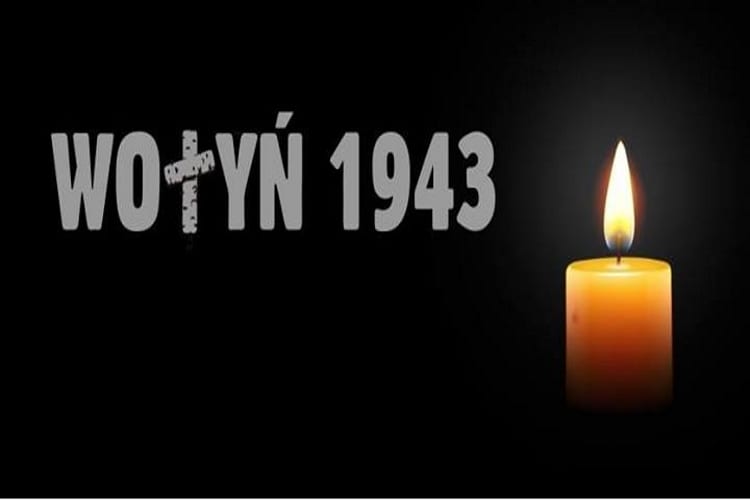
Ukraine and Poland have a checkered past. Tensions were inflamed during the Polish-Ukrainian War of 1918 to 1920. Ukrainian territory was carved up between Russia and Poland in the run up to World War II, worsening the two nations’ already fraught relationship. While both countries have now gained independence, a degree of historic rivalry remains.
In June 2019, an event was organized between Polish and Ukrainian citizens in the border town of Przemysl, Poland. It was hoped the participants could find some common ground. But Polish nationalists gatecrashed the event and began drowning out the conversation with loud music. The protesters held aloft signs that referenced the Volhynia Massacre (1943 – 1945). Throughout Nazi-occupied Poland, Ukrainian nationalists slaughtered an estimated 100,000 Polish residents.
One of the activists, Tomasz Grabowski, angrily retorted “Down with Polish fascism.” This clearly struck a nerve with the authorities, who swooped in to arrest Grabowski on suspicion of insulting the Polish nation.
Polish politician and lawmaker Patryk Jaki defended the arrest, stating “no person and no nation should be insulted. Nobody should be insulted as fascists.”[3]
7 Making a Monk’s Name Sound Like Pasta (Greece)
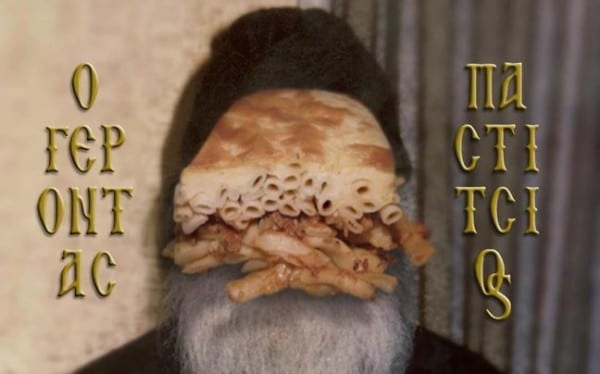
Until July 2019, stringent blasphemy laws still existed in Greece. This led to a number of highly controversial arrests, including that of Philippos Loizos. The young atheist felt disheartened by the nation’s response to the eurozone crisis. In particular, Loizos criticized his fellow countrymen for waiting for some kind of divine intervention. “It seems like every time there’s a crisis in Greece, there’s a search for saviors,” explained the scientist and blogger. He decided to mock religion on Facebook.
In 2012, Loizos created the fictional character Elder Pastitsios, a jocular reference to the respected Greek monk Elder Paisios. Loizos morphed an image of the elder’s face into pastitsio – a Greek pasta bake dish. Some of the “Pastafarian’s” make-believe companions included the Flying Spaghetti Monster and a baby Jesus dinosaur.
The Electronic Crimes Unit received a deluge of complaints about Loizos’ Facebook page. He was quickly arrested on suspicion of blasphemy and causing religious offence. After a lengthy legal battle, the courts slapped Loizos with a 10-month suspended sentence. But this story had a happy ending. The sentence was quashed during a retrial in 2017. And the blasphemy law used to convict Loizos was finally scrapped this year.
Many in Greece still follow the teachings of Elder Paisios, even after his death in 1994. He is regarded as a prophetical figure of the Orthodox Church, credited with predicting Greece’s economic crisis and even Brexit.[4]
6Pretending to be a Ghost (Britain)
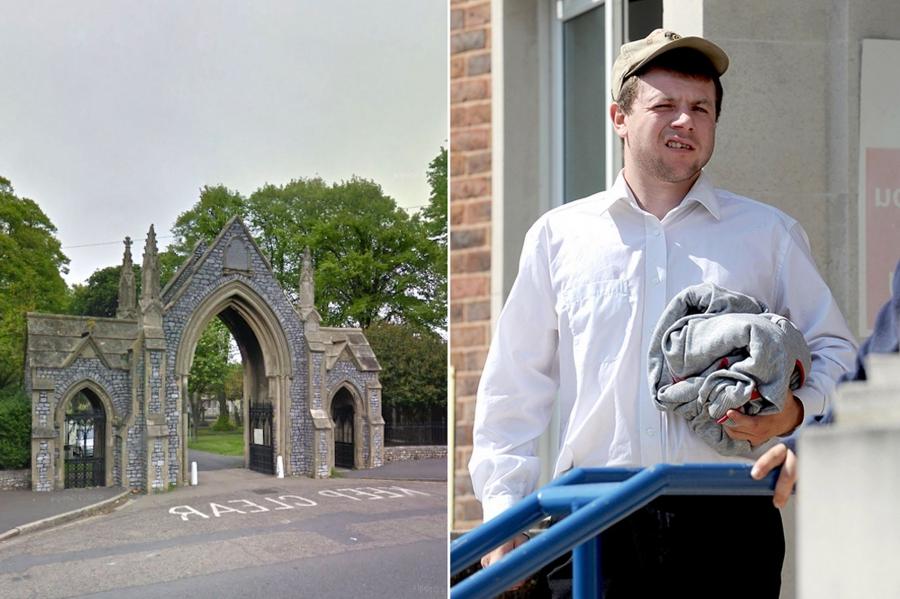
A 24-year-old man from Portsmouth, England, was arrested for behaving in an unsettlingly spooky manner. In 2014, Anthony Stallard entered Kingston Cemetery and kicked off a soccer match with his friends. Stallard, in all his wisdom, then decided to broadcast a series of ghost noises. The prosecution describes it best:
“He was throwing himself backwards, waving his arms about and going ‘wooooooo’. I’m assuming he was pretending to be a ghost.”
Unsurprisingly, Stallard had been drinking. Unimpressed, a group of mourners called the cops. The police quickly apprehended the terrifying apparition, arresting him on suspicion of using “threatening or abusive words or behavior likely to cause distress.” An apologetic Stallard pleaded guilty in court. He received a fine of £35 ($43), along with a victim surcharge and court fees. The judge handed Stallard a 3-month suspended sentence, which was added to a previous suspended sentence for harassment.
With Halloween fast approaching, Brits should take care when selecting their costumes. Nottinghamshire cops once arrested a 21-year-old university student for carrying a toy knife to a fancy dress party. In 2008, Anthony Radley dressed up in a Rambo costume and made his way to a friend’s party. The police spotted Radley’s plastic knife and promptly arrested him on suspicion of causing public alarm. The Crown Prosecution Service eventually saw sense and dropped the case. Unfortunately, Radley will never get back the 3 hours he spent in a police cell.[5]
5 Cartoons (Netherlands)
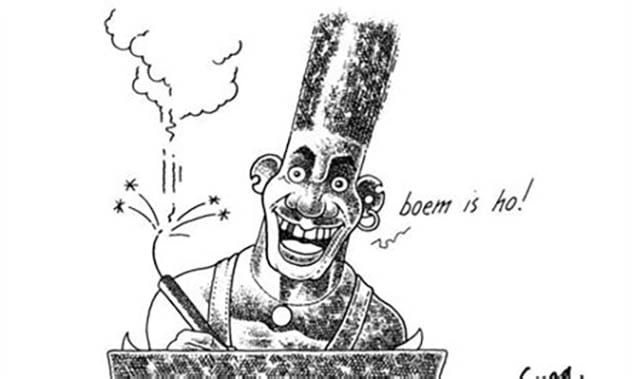
In 2008, the Dutch cartoonist Gregorius Nekschot was arrested for, “publishing cartoons which are discriminating for Muslims and people with dark skin.” As with many European countries, the Netherlands has enacted stringent hate speech laws that prohibit the incitement of hatred, discrimination or violence. Nekschot was arrested and locked in a police cell for the night. Meanwhile, officers ransacked the cartoonist’s home, seizing sketchbooks that contained many of his unpublished works. They also took CDs, DVDs, USB drives, a computer, and a mobile phone.
Nekschot, whose real name remains protected, is known for drawing cartoons that criticize Islam, Christianity, and various political ideologies. Naturally, his satirical artwork has drawn threats from these aggrieved groups. It took the authorities 3 years to uncover Nekschot’s real identity and track him down.
The Dutchman’s case was eventually dismissed after a 2-year-long investigation. The public prosecution department dropped the charges, but only because the police had received no further complaints. However, the cartoonist was banned from re-uploading the images to his own website. And the established print media were only allowed to republish the doodles for journalistic purposes.
Nekschot eventually stopped drawing cartoons, as publishers became wary of showing his work. He was also afraid of further retribution from both the state and violent fundamentalists. In 2011, he put down his pen for good.[6]
4 A Naughty Poem (Germany)
Turkish President Recep Erdogan is pretty thin skinned at the best of times. But, in 2016, one German comedian went to extraordinary lengths to attack the Islamist’s delicate ego. Presenting his satire show Neo Magazin Royale, Jan Bohmermann read out an offensive ditty about the president. His handy work, titled “Defamatory Poem,” included insulting remarks about Erdogan’s sexuality and genitalia. It also hinted that the Turkish president was dim-witted and lusted after various barnyard animals.
Elements of Germany’s sizable Turkish population took offence. Large crowds of angry protesters congregated outside the headquarters of the public broadcaster, ZDF, in response to its decision to air Bohmermann’s show. Erdogan himself submitted a legal complaint to the German authorities, citing the nation’s own laws against insulting foreign officials.
The German state responded quickly. The public prosecutor’s office sent Bohmermann a cease and desist notice to stop him from repeating the poem. The comedian’s TV and radio shows were temporarily taken off the air. ZDF removed the poem from its website and archives. And German Chancellor Angela Merkel apologized to Erdogan and gave the green light for Bohmermann’s public prosecution. Meanwhile, Bohmermann received a torrent of abuse and needed police protection.
Both private and public prosecutions against Bohmermann were eventually dropped. In 2016, the government also scrapped the law against insulting foreign heads of state. However, a Hamburg court ruled that Bohmermann could not repeat 18 of the 24 lines of his poem. The media was also not allowed to republish these inflammatory lines, as it was argued they compromised the Turk’s “personal dignity.”
Erdogan’s actions will come as a surprise to few Turkish citizens. The 65-year-old has submitted thousands of cases against his own citizens, many of whom are accused of the mildest of slights. One man was even punished for comparing Erdogan to the J. R. R. Tolkien character Gollum.[7]
3 “Casse-toi, pauvre con” (France)
In 2008, a member of France’s Left Party got into hot water over a banner that insulted then-French President Nicolas Sarkozy. Herve Eon, an embittered socialist, held aloft a sign that read, “Casse-toi, pauvre con” or “Piss off, loser.” The incident, which took place in Laval in northwestern France, resulted in the man’s arrest.
The courts found Eon guilty of insulting a head of state and fined him 30 euros ($40). The Court of Appeal upheld the decision. In particular, the judges were unimpressed by Eon’s lack of remorse. An apology, which Eon refused to give, could have resulted in the courts overturning the penalty.
But here is the kicker. Sarkozy had previously used this very same insult. While attending the Paris International Agricultural Show that same year, the president became angered when a man rejected his handshake. “Oh no, don’t touch me,” said the man. “You’ll get me dirty.” Sarkozy’s impolite retort has been a popular expression ever since.
Eon took his case to the European Court of Human Rights in Strasbourg. The court agreed that the phrase was satirical in nature. The judges criticized France’s handling of the case, saying it had behaved disproportionately. The law used to convict Eon, which dates back to 1881, was eventually repealed in 2013.[8]
2 Sexism (Belgium)
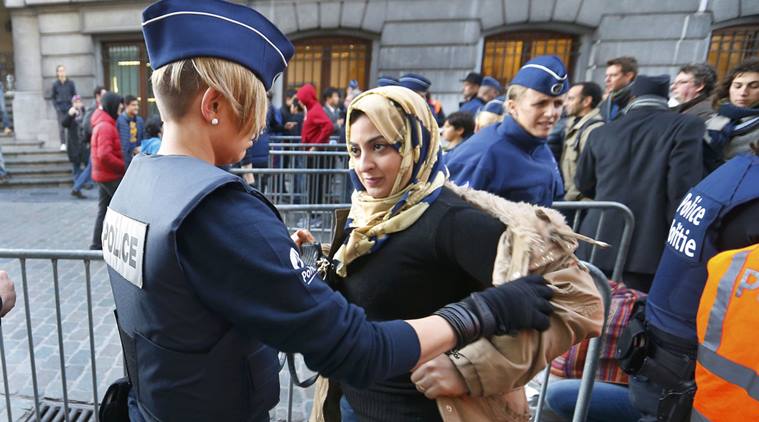
Belgium has recently introduced an anti-sexism law that makes it a criminal offense to make sexist remarks in public and on social media. The law, passed in 2014, carries a maximum penalty of 1-year imprisonment and a 10,000 euro fine ($11,000).
In 2016, officers confronted a man for jaywalking in Zaventem, a small town near Brussels. The officers gave chase after the 23-year-old fled the scene. Once captured, the man directed his ire at a female police officer. “Shut your mouth,” he cried. “I don’t talk to women, being a police officer is not a job for women.” The potty-mouthed delinquent finished his tirade by calling the woman a “dirty whore.”
The man, who remains unnamed, initially accused the cops of targeting him based upon his race. The judge sided with the police in court, fining the man over $3,400. The case represents the country’s first ever conviction for sexism. Anyone in Belgium who expresses “contempt” for another person’s sex could now face similar charges.[9]
1 Denying the Holocaust (Austria)
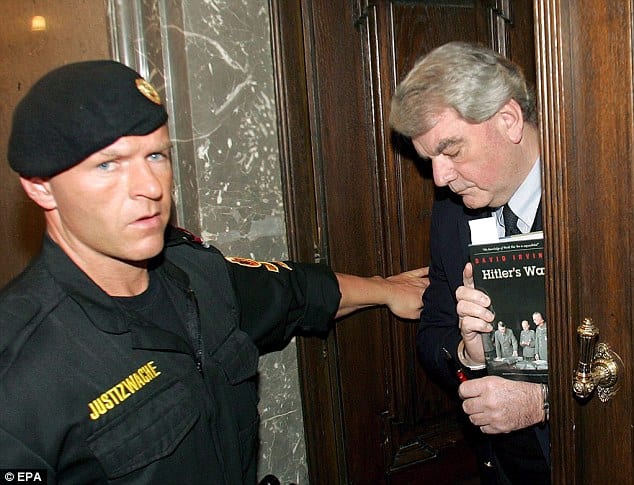
Austria has some of the harshest holocaust denial laws in Europe. In 2006, an Austrian court found the English historian and writer David Irving guilty of denying the holocaust. Many historians have accused Irving of historical revisionism. The author had previously suggested that Adolf Hitler was unaware of Nazi atrocities committed against the Jews. While speaking at two events in Austria in 1989, the Brit even claimed that the Poles had constructed the gas chambers after the collapse of the Third Reich. He also downplayed the number of Jewish people murdered throughout Nazi-occupied Europe.
Irving was sentenced to 3 years in prison for his comments. He was convicted under Austria’s Verbotsgesetz 1947 law, which was designed to expunge all Nazism from the country. During the trial, Irving said he had changed his opinion on the Holocaust and accepted that his previous statements were factually incorrect. In 2006, he was released from prison and deported to the United Kingdom.
Irving is now barred from entering numerous countries, including Austria, France, Germany, Lithuania, South Africa, Canada, Australia, and New Zealand.
More recently, a man was arrested in Austria for allegedly dressing up as Adolf Hitler. He was seen wandering around Braunau am Inn, the Fuhrer’s place of birth. The 25 year old made his way into a local bar, introduced himself as “Harald Hitler,” and ordered a mineral water. The police arrested him on suspicion of glorifying Nazism.[10]
For more lists on rights and freedoms see 10 Times Britain Said ‘No’ To Free Speech, and 10 Arguments Against Gun Control, and 10 Arguments for Gun Control.






